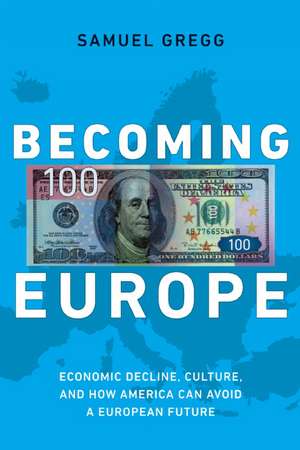Becoming Europe: Economic Decline, Culture, and How America Can Avoid a European Future
Autor Samuel Greggen Limba Engleză Hardback – 7 ian 2013
“We’re becoming like Europe.” This expression captures many Americans’ sense that something has changed in American economic life since the Great Recession’s onset in 2008: that an economy once characterized by commitments to economic liberty, rule of law, limited government, and personal responsibility has drifted in a distinctly “European” direction.
Americans see, across the Atlantic, European economies faltering under enormous debt; overburdened welfare states; governments controlling close to fifty percent of the economy; high taxation; heavily regulated labor markets; aging populations; and large numbers of public-sector workers. They also see a European political class seemingly unable—and, in some cases, unwilling—to implement economic reform, and seemingly more concerned with preserving its own privileges. Looking at their own society, Americans are increasingly asking themselves: “Is this our future?”
In Becoming Europe, Samuel Gregg examines economic culture—the values and institutions that inform our economic priorities—to explain how European economic life has drifted in the direction of what Alexis de Tocqueville called “soft despotism,” and the ways in which similar trends are manifesting themselves in the United States. America, Gregg argues, is not yet Europe; the good news is that economic decline need not be its future. The path to recovery lies in the distinctiveness of American economic culture. Yet there are ominous signs that some of the cultural foundations of America’s historically unparalleled economic success are being corroded in ways that are not easily reversible—and the European experience should serve as the proverbial canary in the coal mine.
Americans see, across the Atlantic, European economies faltering under enormous debt; overburdened welfare states; governments controlling close to fifty percent of the economy; high taxation; heavily regulated labor markets; aging populations; and large numbers of public-sector workers. They also see a European political class seemingly unable—and, in some cases, unwilling—to implement economic reform, and seemingly more concerned with preserving its own privileges. Looking at their own society, Americans are increasingly asking themselves: “Is this our future?”
In Becoming Europe, Samuel Gregg examines economic culture—the values and institutions that inform our economic priorities—to explain how European economic life has drifted in the direction of what Alexis de Tocqueville called “soft despotism,” and the ways in which similar trends are manifesting themselves in the United States. America, Gregg argues, is not yet Europe; the good news is that economic decline need not be its future. The path to recovery lies in the distinctiveness of American economic culture. Yet there are ominous signs that some of the cultural foundations of America’s historically unparalleled economic success are being corroded in ways that are not easily reversible—and the European experience should serve as the proverbial canary in the coal mine.
Preț: 106.86 lei
Nou
Puncte Express: 160
Preț estimativ în valută:
20.45€ • 21.45$ • 17.02£
20.45€ • 21.45$ • 17.02£
Carte indisponibilă temporar
Doresc să fiu notificat când acest titlu va fi disponibil:
Se trimite...
Preluare comenzi: 021 569.72.76
Specificații
ISBN-13: 9781594036378
ISBN-10: 1594036373
Pagini: 363
Dimensiuni: 160 x 231 x 36 mm
Greutate: 0.7 kg
Editura: ENCOUNTER BOOKS
Colecția Encounter Books
ISBN-10: 1594036373
Pagini: 363
Dimensiuni: 160 x 231 x 36 mm
Greutate: 0.7 kg
Editura: ENCOUNTER BOOKS
Colecția Encounter Books
Recenzii
"Gregg spotlights the perils of American progressive arrogance so clearly they can no longer be denied or ignored. His logic is incontrovertible. Every economist, historian and politician should read Becoming Europe."
— Amity Shlaes, author of The Forgotten Man and Coolidge.
"Becoming Europe might not sound so bad: old buildings, long lunches, generous welfare. But, believe me my friends, it's not where you want to be. Europe is a terrifying example of what happens when the state gets too large and the money runs out. Don't imagine that it couldn't happen to you."?
— Daniel Hannan, British Conservative Member of the European Parliament
"Highly readable, well-researched and extremely timely. This book is the definitive case why America should cling to its belief that liberty and free enterprise are the source of human flourishing rather than follow Continental Europe into corporatism, big government and economic stagnation. It deserves to be widely read."
— Lord Griffiths of Fforestfach, Vice Chairman Goldman Sachs International and former special adviser to Margaret Thatcher
“How have European political elites stifled innovation and emptied out freedom in the name of solidarity and social justice? Samuel Gregg tells us how, with clarity and detail. And he tells us how we Americans can retain and reignite our spirit of civic entrepreneurship and love of economic freedom. This book is a sober warning for all of us. But it’s also a vital guide for everyone who want to preserve the free society and the uniqueness of the American experiment.”
— Edwin J. Feulner, President, The Heritage Foundation
Notă biografică
Samuel Gregg is director of research at the Acton Institute. He is the author of many books, including On Ordered Liberty (2003), his prize-winning The Commercial Society (2007), and Wilhelm Röpke’s Political Economy (2010). He lectures regularly in America and Europe on topics encompassing political economy, economic culture, and morality and the economy. His writing has appeared in academic journals and magazines including National Review, The American Spectator, and Crisis Magazine, as well as newspapers throughout America, Europe, and Latin America.
